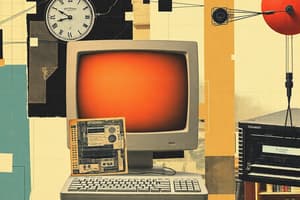Podcast
Questions and Answers
What term is also known as ubiquitous computing?
What term is also known as ubiquitous computing?
- Application computing
- Digital computing
- Pervasive computing (correct)
- Mobile computing
Before 1980, what was a primary characteristic of computers?
Before 1980, what was a primary characteristic of computers?
- Used for personal tasks primarily
- Widely accessible to the public
- Small and cheap
- Large and expensive (correct)
What percentage of US households include a computer today?
What percentage of US households include a computer today?
- 95%
- 85%
- 90% (correct)
- 75%
Which of the following is NOT a common use of computers in homes?
Which of the following is NOT a common use of computers in homes?
What is a characteristic of smart homes?
What is a characteristic of smart homes?
How are schools integrating technology into education?
How are schools integrating technology into education?
What is a significant trend in workplace computer usage?
What is a significant trend in workplace computer usage?
What role do wireless hotspots play in education?
What role do wireless hotspots play in education?
Flashcards
Pervasive Computing
Pervasive Computing
The widespread use of computers in various aspects of daily life, often with the ability to connect and share information.
Computer Literacy
Computer Literacy
Basic knowledge and skills needed to use computers effectively, including understanding their components, navigating interfaces, and performing common tasks.
Microcomputers in the Early 1980s
Microcomputers in the Early 1980s
The transition from large, expensive computers to smaller, more affordable personal computers, making them accessible to a wider audience.
Convergence of Electronic Devices
Convergence of Electronic Devices
Signup and view all the flashcards
Computers in the Home
Computers in the Home
Signup and view all the flashcards
Computers for Reference, Productivity, and Entertainment
Computers for Reference, Productivity, and Entertainment
Signup and view all the flashcards
Smart Appliances
Smart Appliances
Signup and view all the flashcards
Smart Homes
Smart Homes
Signup and view all the flashcards
Study Notes
Course Information
- Course title: Application of Information and Communication Technology (CS-143)
- Lecture number: 01
- Instructor: Sajiya Tariq
- University: GIFT UNIVERSITY
Lecture Outline
- Introduction to the course
- Course outline discussion
- Role of computers in daily life
Computers in Daily Life
- Why learn about computers?
- Pervasive Computing (Ubiquitous Computing): Computers are integral parts of daily life.
- Basic Computer Literacy: Understanding computer operation is crucial.
Computers Before 1980
- Computers were expensive and large.
- Access was limited to a few.
- Primary use was for high-volume processing tasks.
Computers in the 1980s
- Microcomputers become inexpensive.
- Increased personal computer use.
- Computer adoption rises drastically
Computers Today
- Nearly 90% of US households have computers.
- Convergence of electronic devices.
- Multiple capabilities – E.g. e-mail, internet access, TV, on a single device (e.g., smart TVs, smartphones)
- Computer literacy vital for everyone.
Computers in the Home
- Versatile uses in the home:
- Information research and news access
- E-mail exchange
- Paying bills
- Watching videos
- Music and movie downloads
- Photo organization
- Game playing
- Making vacation plans
- Modern uses:
- Reference, productivity, and entertainment
- Wireless networking
- Use across all locations
- Use of smart appliances with built-in computer technology
- Monitoring household tasks
Computers in Education
- Youth = "computing generation"
- Computer labs and classrooms are common.
- Integration of e-books into curriculums.
- Increased use of wireless hotspots in colleges and universities.
- Computer use requirements in educational settings
- Distance learning is accessible (e.g., BYOD).
Computers in the Workplace
- Universal tool for decision-making, productivity, and communication.
- Use by all professionals, security measures and service.
- Essential for military operations.
- Constant upskilling is needed.
- Specific workplace uses: decision making, productivity, off-site communication, and authentication
Computers on the Go
- Computers are integral parts of everyday life now.
- Examples:
- Consumer kiosks
- Automated teller machines (ATMs)
- Point-of-sale (POS) systems in retail shops
- Self-checkout systems
- Consumer authentication systems
- Portable computers and mobile devices
- GPS systems
Technology and You (Example)
- Restaurant iPad Ordering Systems: Used with e-menus, enabling customer order placement and payment. Provides extra resources for customers. (e.g., menu options, pictures).
Studying That Suits You
Use AI to generate personalized quizzes and flashcards to suit your learning preferences.




